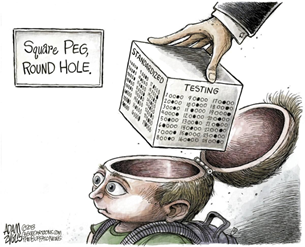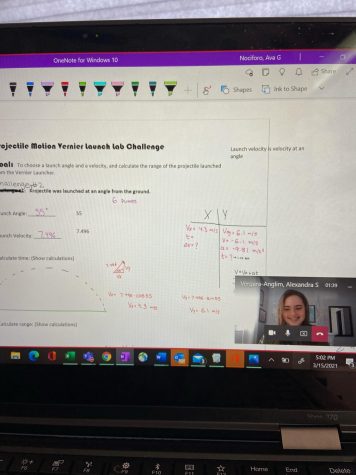Class Rank Will Graduate This Year
Typically class rank does the numbering, but now its days are numbered.
Effective Sept. 2021, a new policy approved by the School Board on Feb. 16 will usher in three big changes: the elimination of class rank, the elimination of valedictorian and salutatorian and the counting of electives (barring physical education) as college prep credit in GPA.
Head Principal Dennis Williams described the decision in the context of two measures: its hindrance to students as a statistic and stressor, and its uselessness in the eyes of post-secondary institutions.
“Our traditional class rank determines the rank of students on a weighted grade scale. It would be a valid statistic if every student took the same set of classes with the same set of teachers and with equal weighting,” Mr. Williams said. “But there are so many variables. Relatively small differences in GPAs can result in relatively large differences in class rank. It’s difficult to justify how class rank benefits students.”
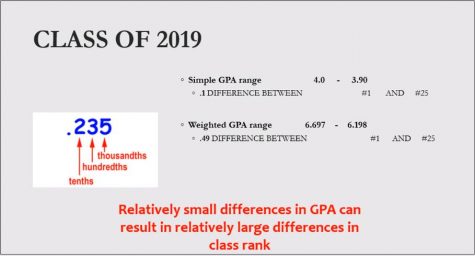
He continued, “There’s a self-fulfilling prophecy that goes with class rank. If a kid is ranked low, they think, ‘I won’t challenge myself. I’ll never be able to improve.’ Class rank is such a driver; what hit me in my first few years was that students refused to take classes of interest to them because of the impact it would have on their class rank. We don’t want to create an environment like that. We want to be in a position where kids can pursue their interests and not be concerned about what it will do to their GPA. College admissions officers want you to take classes you like, too, and do well in them.”
Guidance chairman and counselor Mr. Philip Noonan shared the same thoughts: “I have personally experienced many cases where worries about ranking status caused a high-achieving student to design his or her educational program around class rank and GPA-boosting courses instead of interests, passions and talents, which is sad and disappointing. Ranking often fosters unhealthy competition instead of collaboration.”
Mr. Noonan pointed out that “reporting class rank works against more students than it helps. Essentially, it’s important to the best and brightest but irrelevant to the masses. If you’re not in the top 20th percentile, it doesn’t matter in a meaningful way to most competitive colleges. In general, class rank does not benefit those who fall below a predetermined percentile.”
In addition to disadvantaging students in high school, class rank is also a crutch for college admissions.
“Eighty-three percent of colleges don’t look at our class rank, they recalculate it,” Mr. Williams explained. “Knowing what I know about college admissions, class rank doesn’t matter. It comes down to the SAT, ACT, AP exams. For colleges and universities that contact us and ask about class rank for scholarships, we will provide that information, but everyone recalculates because there’s no way for colleges to have kids on a common playing field when every school does it differently. We’ve found that we’re at a disadvantage because we rank and other schools don’t.”
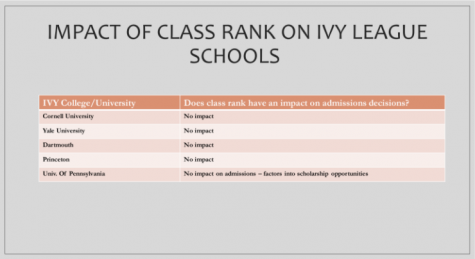
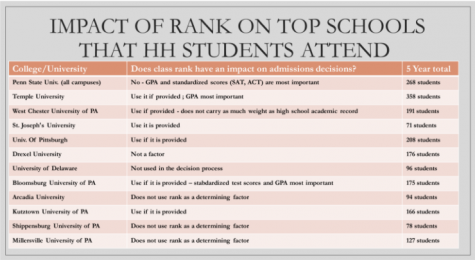
He compared it to the removal of the A+ grade this school year:
“Starting to have conversations about class rank is an opportunity to fix everything. Many schools are moving to just A, B, C, D and F. We hear from college admissions officers all the time about our weighted scale, how it doesn’t correlate to anything. I don’t know if the A+ will come back, but that would be the rationale as to why not. We don’t want an awkwardly-weighted GPA. For any change we make, we’d write on the transcript that there were changes to communicate with colleges.”
The elimination of class rank will also extend to the removal of valedictorian and salutatorian. Instead, several speakers will be chosen to give commencement speeches.
“I want to have an application process for the top five percent, and take about four kids,” Mr. Williams said. “I think this creates a more well-rounded depiction of the class. That’s one of the things we’re excited about.”
The third change, the counting of all previously uncounted electives except physical education as college prep credit in GPA, is “also to join forces with what other schools are doing,” said Mr. Williams. “This is also for students at the Eastern Center, who work their butts off for courses that don’t count, and for teachers who’ve expressed that they feel like their content doesn’t matter.”
“For the rest of this school year, though, it’s business as usual,” he concluded. “There will be a valedictorian and salutatorian. And in the next few weeks, I’m going to be doing a session with parents, too. I want to make sure they have an idea of what’s going to be happening.”

Class of 2023
Favorite food: Mango
Favorite school subject: Literature/World history
Favorite animal: Bunny
Favorite part of being on The...



